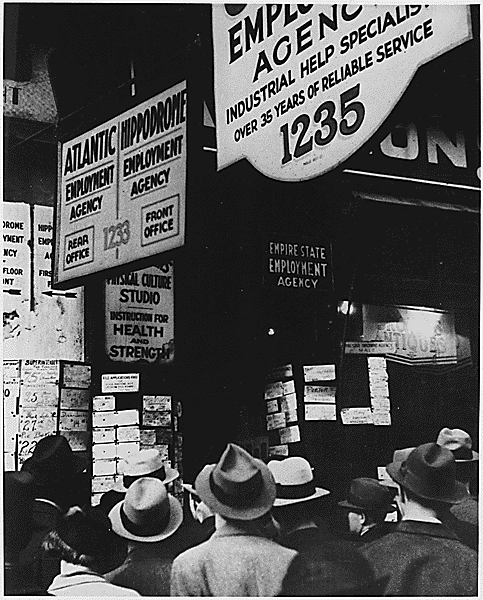Black Doorways: Empire State, 1937
.
Unemployment Agency, Sixth Avenue, New York, New York: Arthur Rothstein, 1937 (Franklin D. Roosevelt Presidential Library)
Employment agency on Sixth Avenue, New York, New York: Arthur Rothstein, December 1937 (Farm Security Administration/Office of War Information Collection, Library of Congress)
Employment agency, Sixth Avenue, New York, New York: Arthur Rothstein, December 1937 (Farm Security Administration/Office of War Information Collection, Library of Congress)
Undertaker's establishment on East 63rd Street, New York, New York: photo by Sheldon Dick, 1937/8 (Farm Security Administration/Office of War Information Collection, Library of Congress)




It probably sounds incredibly stupid, but one thing that makes the unemployment agency photos so poignant for me is how nicely the men dressed and presented themselves in such an awful situation. As "plus c'est la meme chose" as things definitely are, there's also a sartorial "plus ca change" element I can't help noticing.
ReplyDeleteYes, such well dressed men in front of those black doorways, through the last of which one is taken away for good. Hats off to Arthur Rothstein for taking these.
ReplyDeleteAnd hats off to those who pass through the bottom doorway.
ReplyDelete(The undertaker shot is by Sheldon Dick, by the way.)
I remember my father drifting from job to job, with increasing spells of unemployment in between, always looking sharp and spiffy as he went out the door to be, or not be, employed... and wondering about the world.
Naked we came...
Hats off to you, Tom, for posting all of the wonderful photos and accompanying words -- today and all days previously. I know from family stories that during the Dust Bowl's desperate days, my parents and older siblings would wear their best when they went to town even though they'd be covered in dust and tormented by grasshoppers. The gentlemen at the unemployment agency remind me of the hidalgo in Lazarillo de Tormes -- in his only suit, toothpick in his teeth, pretending that he had just eaten.
ReplyDeleteThose were the days of keeping up appearances, weren't they, Marcia?
ReplyDeleteI thought of you, and of the history your family lived through, in reading some of the reports of the 1935 Easter Sunday storms.
I've just now posted a wrenching bit of eyewitness testimony from that day in the comments on "Let It Come Down (The Dust Bowl)", above.
Tom, that testimony makes me cry for all the hard-working, determined, honest people who lived through those dark days. Theirs was a code of honor and another code that I can't begin to articulate, but I understand. As a child I remember sensing the grave concern my parents felt whenever it was a dry year and cracks began to appear in the soil.
ReplyDeleteOne can only imagine what went into the making of people as brave or as capable as the survivors of whom you speak. One can only revere their memory, and their dignity, and marvel at it. Thanks for keeping the spark of that abiding spirit alive in your own life and work.
ReplyDeleteKeeping the memory green, even when it's the memory of hard dry times, is the oldest deepest function of poetry, it may hap.